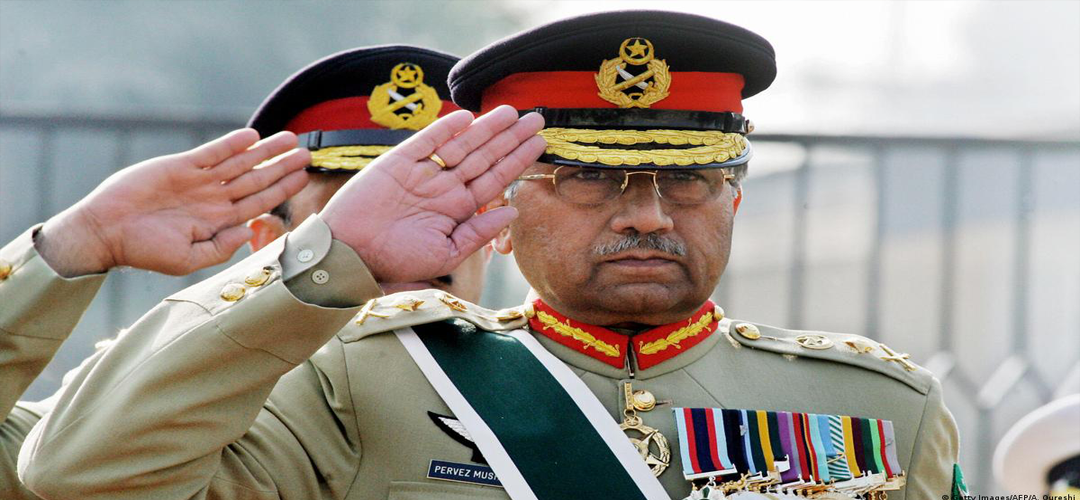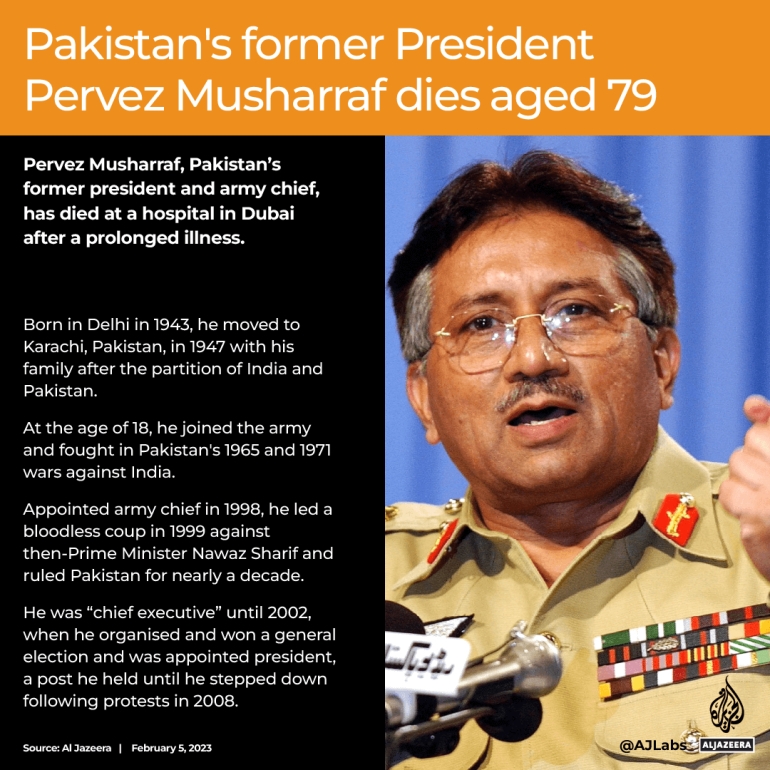The Musharraf Era: Reflections
February 18, 2023 | Expert Insights

By all accounts, Pervez Musharaff was a man of contradiction who has left a legacy that, at best, can be termed confusing! He spoke of creating his brand of democracy, but in his nine years as the "CEO", he neutralised democratic institutions, including, most importantly, the judiciary. He is credited with opening the private sector for media, especially the electronic media, yet did not hesitate to track down individual journalists who dared to belittle him in the public domain.
His most spectacular military action, the Kargil intrusion, will always be remembered as a strategic and operational debacle without any logical strategic end game that left thousands of soldiers unclaimed, unsupported and unfed, with even their mortal remains abandoned by an Army which sent them on a mission without an exit, under the delusion that the world will accept them as mujahedeen!
As the Army Chief when Prime Minister Vajpayee made the historic visit to Pakistan extending the hand of friendship, Gen Musharaff led the other service chiefs in boycotting the traditional diplomatic welcome, refusing to salute the leader of his enemies; yet he claimed in his autobiography that he was closest to clinch a peace deal with India that would have benefited his country!
He claimed to be a moderate Muslim, allowing himself to be photographed publicly with a cigarette in his hand and also with his pet dogs in his arms but gave a free hand to extremist and rabid terror organisations like the LeT, which were to script the brutal 2008 Mumbai massacre soon after Musharaff was evicted from power.
Background
As a muhajir, born in pre-partition Delhi, Musharaff was an exception to reach the pinnacle of power in the all-powerful Pakistani Army, long dominated by the scions of landowning Punjabi clans. Perhaps his apparent lack of constituency within the military made him an attractive (and malleable) choice for Prime Minister Nawaz Sharif, who promoted him over the heads of two other senior generals, an error that was to cost the latter his chair!
Fond of narrating his exploits as a member of the Special Services Group, the Pak Army's high-profile special forces, he tried to use the same bold and impromptu tactics later as an Army Chief both in strategic-level military operations and in his interference with the constitution of his country, with disastrous consequences.
His bloodless military coup of 1999 propelled him into power for almost a decade which saw many upheavals in global geopolitics, leaving a lasting impression on Pakistan's destiny as a nation, a legacy under which the country is still reeling.
In 2007, Musharaff attempted to remove the country's chief justice, which led to widespread protests and calls for his resignation, compelling him to relinquish power in 2008 and seek exile in Dubai. From Dubai, he frequently asserted to re-enter public life and form his political party but was discouraged by his military fraternity, serving and retired. His return to Pakistan was lacklustre, as the country had moved ahead. With no other option available and fearing a re-energised judiciary ready to settle accounts with him for high treason and a host of other capital offences, he, with the grace of the Army, was permitted to continue his comfortable exile in Dubai in 2016, overtly on medical grounds where he ultimately died, alone, unsung and bitter to the end.

Analysis
He was a man of many parts and an architect of many mistakes.
Kargil was the highwater mark of his career, a fact that he never tired of narrating. He claimed later that it would have afforded a spectacular victory to Pakistan, including Kashmir if the political leaders had not quailed and surrendered the military advantage. In retrospect, Musharaff ended up doing the maximum damage to Pakistan’s efforts to paint Kashmir as an Indian Palestine where the people were ripe for a revolution. Just like Operation Grand Slam in 1965, there was not a murmur from the people of Jammu and Kashmir in support of the 'Mujahidin holding the Kargil heights" to 'starve' the Indian Army in J&K. The entire act was viewed by the world as a blatant violation of a well-recognised albeit un-demarcated border by the armed forces and put a quick end to the ‘freedom fighters’ charade that Gen Musharaff was playing out to the international community, especially the U.S. For the first time, internationally, the depth of Pakistan's military meddling in Kashmir was exposed.
It was an ignominious retreat from Kargil heights for a nation brought up on the belief of their military's invincibility and costly in terms of human lives and irreversible damage done to Pakistan's claims on Kashmir. The reams of paper that have been written on the Kargil debacle in Pakistan, both by military and civilian academics, are proof enough of this. More importantly, Kargil proved there was space under the nuclear overhang between nuclear-armed neighbours that either side could exploit as India did in its airstrikes on Balakot.
9/11 was a turning point for the world, and for Pakistan, it was a bonanza as it regained centre stage, propelled as a front-line ally of the U.S. in the global war on terror. Musharaff claimed credit for the 6 per cent economic growth during the best years of his rule. While this was true, the reality, as being analysed by Pakistani economists now when they face a debt default situation, was that there was no actual growth in terms of manufacturing or services, like in India, but a generous flow of funds from an appeasing West, especially the U.S., which gave a patina of prosperity. Once the West realised that Pakistan was playing a double game, the taps were shut, especially after the U.S. left Kabul in disarray in August 2021, an event a smug Pakistani Prime Minister called the 'breaking of shackles of slavery, ’ an epitaph that did not go down well in Washington!
There is a majority opinion in Pakistan that by ‘selling out to the Americans post 9/11’ in exchange for billions of dollars of aid-economic and military- President Musharaff sowed the seeds of the radical terrorism fruits of which the country now reaps in the shape of the TTP and its affiliates. A typical commando, Musharaff failed to take into consideration the sentiments of a significant constituency in the country, including in the military, that looked at the jihad against the Americans as a divine act. Unsurprisingly, a series of assassination attempts on his life, some by serving Army and Airforce personnel, shocked Musharaff and made the nervous military wary of further extending its support to his rule. Once abandoned by the 'establishment', Musharaff's fate was clear-only exile could perpetuate his life.
Assessment
- Pervez Musharaff famously said, “I think the Constitution is just a piece of paper, could be thrown in the dustbin” which all but sums up his political sagacity. For a short while, he did usher in Pakistan's economic and political stability but lacking true depth and foundation, it was only transitory. What was to follow was nothing short of a nightmare that the country continues to live, its economy in shambles and internal revolts tearing it apart.
- The media-savvy Musharaff was a darling of the press, including the Indian. However, his lack of depth on political and geopolitical issues, leave alone economics, started becoming apparent with every passing year of his rule. The Pakistani people realised that while he dreamt of becoming a Pakistani Mustafa Kemal Ataturk, on the ground, he was just another general who had been put in the lofty chair by the 'establishment' and more importantly, he was no Ataturk.
- He leaves no legacy which he could claim as his own and which benefited his country, as subsequent events were to prove. If only he had wholeheartedly supported Nawaz Sharif's peace overtures towards India, which were reciprocated by an amenable Prime Minister Vajpayee, the destiny of Pakistan, and for that matter, the subcontinent could have been different.








Comments